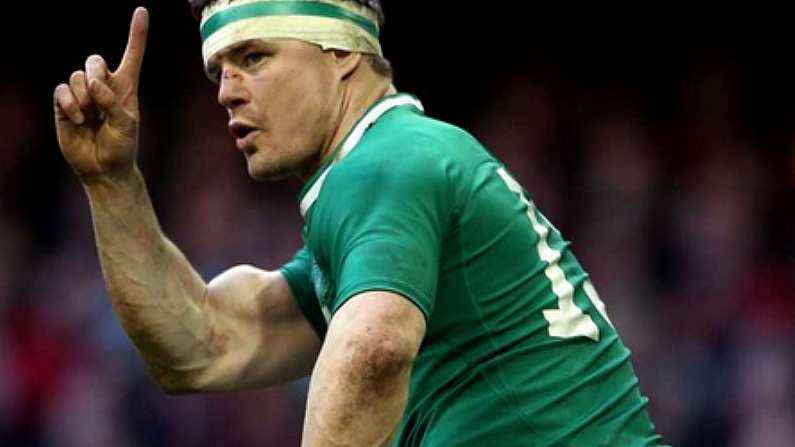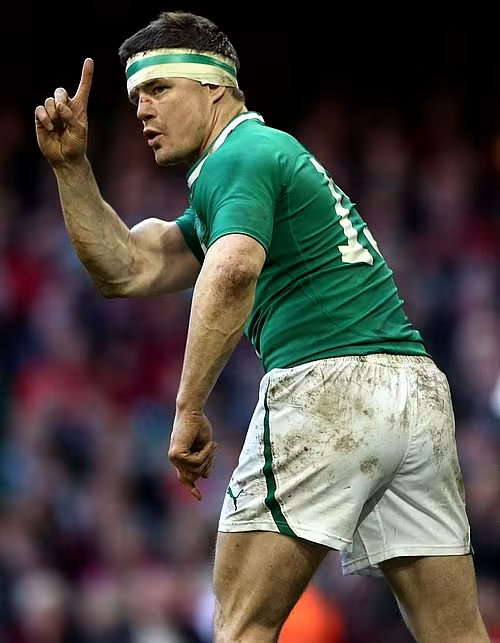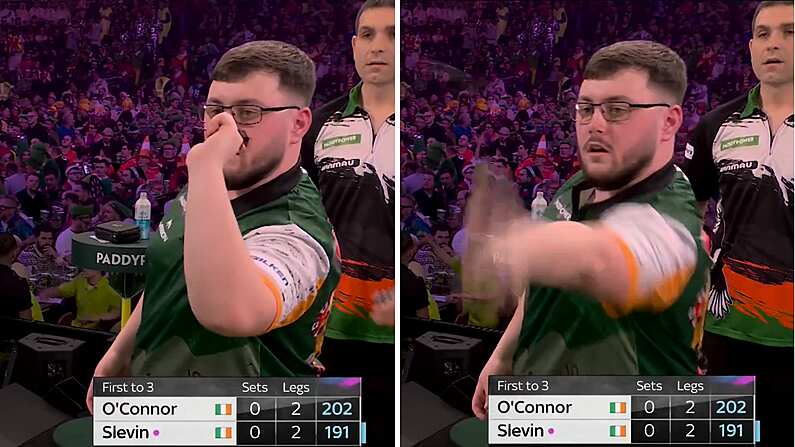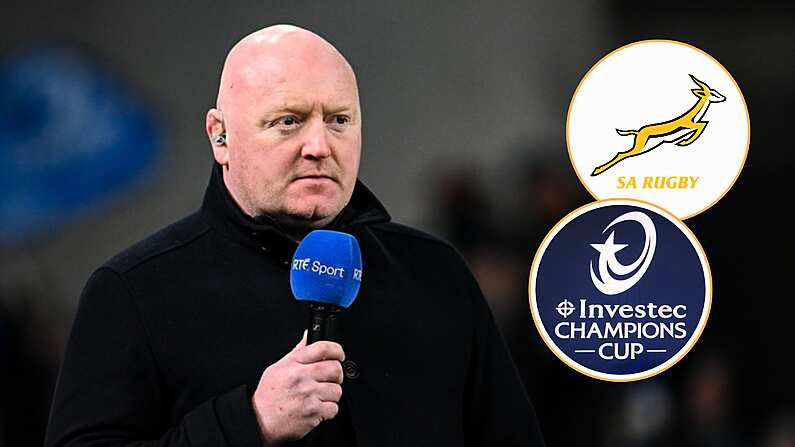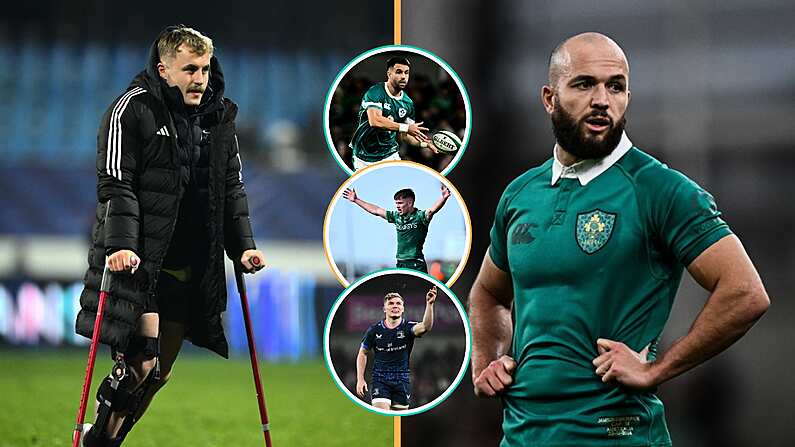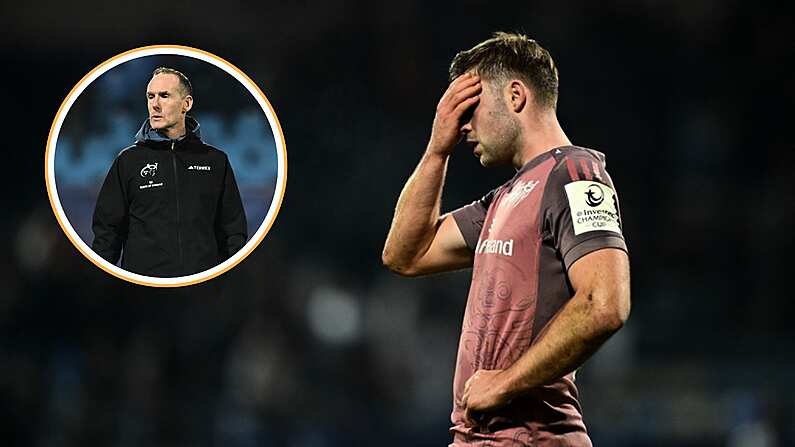Well that was fun, eh? That stormcloud that hung over the Ireland team has been blown away after an incredible Saturday afternoon in Cardiff and it now seems that the sky is the limit. With a potential championship decider seven days away, two of our Rugby Nerds look back on the weekend that was. First off, Gavin Grace looks back at a madcap weekend and ponders what is to come next weekend:
In his pre-match ramblings on Saturday, George Hook said there are four teams who can win this Championship. I'm not espousing the writings of the Hook bible, don't get me wrong, but it's a pretty obvious point that most would have agreed with at the time. Of those four teams, two lost and will look for redemption against each other this weekend. The other two won, and meet in a game which would see the winner arguably have one hand on the Championship trophy. So thrilling as this weekend was, what it has really done is set us up for an ever bigger one coming down the line.
Taking the games in chronological order, there's a lot to be positive about from an Irish point of view. A twenty point half-time lead? We'd have bitten your hand off for that on Friday. The forwards provided quick ball for the backs, who utilized it well and used passes which seemed to genuinely surprise the Welsh. When Ireland didn't have the ball, the defence was stout when it had to be. When the score became 30-3 after the break all was going swimmingly.
However, there was enough in the last half hour to warrant worry. More than once here I've openly doubted whether Gordon D'Arcy is still worth of starting for Ireland. I hope the fact this his absence coincided with a comeback for the home team is just a coincidence. We played well in defence; and held on under huge pressure. However, that Wales were able to dominate in such a way is troubling. Indiscipline (two yellow cards) does not help - nor does giving away a total of 13 penalties mind - but amid the optimism of the opening day win, it's on this portion of the game that Kidney's coaching team should, and probably will focus on this week.
As for our opponents, England did what they had to do, and very well. As the match played out, Scotland never had a chance. With the Scots in a rebuilding phase it's likely that England aren't as good as it perhaps would appear, but then again the same thing can be said about us at our best. For England, job done, and they'll take that.
France on the other hand, suffered from Les Miserables in Rome. What makes it surprising is that they should have seen it coming. It's just two years since Italy won the corresponding fixture, so why did France play like a side who thought they simply had to show up to win? Fair play to Italy - their fight was immense and there isn't a team in the competition who would have won with ease. France were caught on the hop - no one else will - but the lack of leadership and fight from the away team put a blemish on an otherwise fantastic game, and a great climax to the weekend. Roll on Week Two.
Paddy Logan looks back on a classic game of two halves.
Being exiled and without the option to watch RTE, it was only on Sunday morning that I watched Tom McGurk’s stirring preview piece for the Six Nations. It was magnificent and had precisely the desired effect on my rugby soul (if you haven’t seen it I suggest you watch it here ). But one line stood out:
‘Perhaps the most poignant question of all for the 2013 Six Nations: will this be the great man’s last hurrah? If so, let us hang out our brightest colours in celebration.’
After yesterday’s performance I think that we should put the bunting away and keep the champagne on ice. BOD was simply magnificent, head and shoulders above all the young pretenders, particularly those in red, and so far ahead of his direct competitor, the inexplicably woeful JJV Davies, that it is hard to believe respected pundits (and yours truly) had the Welsh centre as a Lions starter. The highlight was, of course, the sublime catch of Sexton’s rifled pass, the injection of pace to get outside Davies, and then the perfect pass to put Zebo over in the corner for Ireland’s first score. He was back to his best in every regard and never more so than during Ireland’s extraordinary defensive stint in the last half an hour. There were other outstanding Irish performers, but I don’t think Phil Matthews will have many easier decisions to make than selecting O’Driscoll as his man of the match.
In my preview on Friday, I predicted that Ireland would win narrowly and that the last 10 minutes would be painful viewing. In the end, the last 10 minutes were tense enough but at half-time that prediction looked a little silly as a nigh-on flawless Ireland had romped to a 20-point lead courtesy of the aforementioned brilliance from O’Driscoll, perfection off the tee from Jonny Sexton and a try from Cian Healy that was made by a breathtaking passage of play with two pieces of individual brilliance: Rory Best’s chargedown and fabulous pass; and the outrageous flick by Zebo, which will be on the highlights reel for this tournament and many to come and has cemented him as rugby’s latest superstar.
Wales had been very poor but that should not detract from the excellence of Ireland’s first-half performance. Of particular note was the speed and quality of the ball created by some precise clearing out at the ruck, aggressive defence and a very fine marauding performance by Peter O’Mahony, fully justifying his selection ahead of Chris Henry.
Straight after half-time it was more of the same. Wales had clearly decided to keep the ball in hand and, straight from the kick off, conceded a scrum on their 22 following yet another fine choke tackle by Mike McCarthy. It was one of the dullest pieces of rugby you will ever see and led shortly thereafter to O’Driscoll’s try that put Ireland 27 points to the good and seemingly out of sight.
But those were the last points Ireland were to score and the game was to be turned on its head with Wales applying all the pressure and Ireland having to make almost 100 tackles in the final 30 mins. That the turnaround coincided with the loss of D’Arcy and the introduction of Justin Tipuric seems highly significant to me. The Welsh speed and intensity went up several gears and they retained the ball for long periods, allowing them to put enormous pressure on the Irish line. Just when they needed it most, Ireland’s defensive organisation deserted them, allowing Cuthbert to burst through, untouched for the first Welsh try.
There is no doubt that Ireland’s defensive efforts were heroic: SOB’s tackle count of 23 was astonishing, whilst McCarthy, Ryan, Heaslip and Healy had stats that on most other days would have set them apart. However, I can’t help thinking that, yet again, the Welsh were not made to work hard enough to get into the Irish 22. Sometimes I’d rather we just looked to chop players down behind the gainline, rather than concede ground whilst looking to execute the choke.
In their defence, Ireland did play 20 of the last 30 minutes with only 14 men. Whilst Ireland did infringe repeatedly, the binning of Best seemed ridiculously harsh. Having re-watched the incident several times, I cannot see how Poite could have adjudged him to enter from the side and it looked a pretty fair turnover to me. Meanwhile, at the same maul (sorry Romain, ruck(?)) Phillips was busy trying to snap Bob’s achilles with some well directed stamps that were nowhere near the ball. Shortly afterwards, Jonny Sexton was clearly caught in the face by some ‘careless’ footwork by Tipuric or Phillips (or both) that should have been a penalty to Ireland at the very least. Instead, Wales went across the pitch to score their second try.
I’m not saying that Poite’s refereeing cost us the game, nor that he wasn’t fair, but there is no doubt that we were on the wrong side of some decisions which didn’t help. Whilst I’m at it, he awarded two short arm scrum penalties against Ireland in the first half. At the first scrum (plus ca change) Poite seemed to forget to say set and then pinged Ireland for early engagement. At the other, Ireland went on the ’set’, Wales didn’t and Ireland were pinged. It must be infuriating for the players. It certainly makes my blood boil.
Whatever the rights or wrongs of the sin-binnings, given that Ireland were one man short for 50% of the second half, they did well not to concede more and will take heart from some heroic defending. Gilroy’s performance in the second half was especially pleasing. We all know what he can do in attack, but he made a couple of important interventions and the hit on Halfpenny to snuff out a threatening Welsh attack was hugely impressive. The boy can play and Tommy Bowe is going to have to work hard to regain his shirt once his knee is fixed.
My one major complaint is that Kidney again failed to make full use of the bench. I can understand why he didn’t bring ROG on during a prolonged defence of our own line, and the same goes for Reddan. But why did it take until the 72nd minute to bring on Kilcoyne? Our scrum was creaking and Healy is only superhuman, not a deity (only BOD qualifies on that count). If Deccie was worried about Kilcoyne’s scrummaging, he should have gone with Tom Court, one of Europe’s form looseheads who would definitely have done a job. If it wasn’t that, then what was he thinking? The same goes for DOC. You couldn’t find a player better suited to that last 20 minutes of that game yet he waited until the last 8 minutes to bring him on. I really hate to be critical when Ireland have won away in Cardiff, but this is the single most frustrating aspect of the Deccie reign and I simply don’t understand it.
There is also some concern over the injuries to POM, D’Arcy and especially Ross – let’s hope none of them are too serious and they will all be available for selection. Whilst O’Mahony was excellent, we are not short of quality backrow forwards. I’d bring Henry in and have Locky on the bench. If Dorce doesn’t make it, I think that McSharry should start. He’s the best available 12 and deserves his chance. If Ross isn’t fit, then we’re up the creek without a paddle, as Deccie Fitz won’t last 80 mins which would require Archer or Bent to continue their education on the international stage, which would not make for comfortable viewing. Whatever your religious persuasion (or lack thereof), keep praying that Ross’s recovery continues undisturbed.
Overall, it was magnificent performance and a fantastic win. However, it is just one win over an out of sorts Welsh team. There is plenty for Ireland to work on in their Kildare retreat over the next week if they are to defeat a resurgent England next Sunday. But we can look forward with optimism following an excellent performance to back up the Autumn win over Argentina.to expunge the memories of last year’s Twickers nightmare.
Ronan Murphy struggles under the burden of too...many...talking...points.
In what was one of the best weekends of rugby in living memory. We got a series of great contests, intense performances and, most importantly, a big Irish win. The Six Nations is back and it's better than ever.
As an opening weekend that couldn't have gone much better for Ireland, could it? Ireland managed to answer many of the questions we had and back up their Argentina performance. On top of a clinical attacking display, a huge defensive performance under enormous pressure showed there's plenty of grit in the team too. To ward off any complacency over beating the Grand Slam champions in their home stadium, there'll be plenty to work on this week, ball retention being key. Fatigue will be Ireland's biggest enemy this week. For now we can enjoy the glow of victory.
Ireland got into bonus territory on Sunday afternoon with Italy's fantastic win over the French. It doesn't make France any less dangerous but they can't win the Grand Slam now.
Player of the Weekend
It was a weekend of high class rugby and every team (bar the French) could put a player forward with great displays. Sean O'Brien's colossal effort against Wales. Justin Tipuric swinging the game violently in Wales direction. Stuart Hogg's pace and swerve. Billy Twelevetrees' scoring debut. The imperious Sergio Parrise and the stunning Luciano Orquera.
But then there's Brian O'Driscoll. I can't add to the cavalcade of praise for the great man, it's all been said. So lets just try and enjoy every moment we get to see him take the field.
Coach of the Weekend
The Irish management can feel pretty happy about game one. Their selections came off and they out-thought the Welsh, learning from the mistakes of the last meetings. However, it was the Italians who stole the show. Their skill levels have gone through the roof since last year's competition; offloading, keeping the ball alive, making linebreaks, taking drop goals. Jacques Brunel and his team deserve huge credit because there was only one team in the Stadio Olympico who should have been wearing blue.
Try of the Weekend
Tempting as it is to give it to Cian Healy's try (the charge down, keeping the ball alive, power and, oh yeah, a little heel flick) try of the weekend has to be Italy's second try. Working almost the length of the field and capped off by a stunning offload from Orquera, it was a thing of beauty.
And now we get to start dreaming about next weekend and England in Dublin...
Finally, check out the big stat crunch from the first weekend of the rugby by Andy McGeady
What a weekend of rugby.
As an opening weekend it had few to match it in living memory. A glorious Irish opening half followed by a brave Welsh fightback; a famous Italian win as they held out against a French side battering the Italian tryline as the final whistle blew. And a decent 38-point England performance sandwiched in between. And Stuart Hogg.
All in all, great entertainment. And here's a few notes that jumped out of the numbers.
Ireland's Tackle Kings
The top five tackles counts on the opening weekend came from men in green jerseys, with Sean O'Brien topping the list at a barely-fathomable 23. But that's what must be expected when one tries to hold out a Welsh side given 79% possession and 81% territory in the second half in the Millennium Stadium.
The Great Parisse
What a performance. Italy's most effective carrier at a full 84 metres, beating France's best, Wesley Fofana, by a metre on the day. Parisse was also Italy's best tackler with ten, without a miss. And he threw in a try and a lineout steal for good measure. He's untouchable at his best, and he was at his best on Sunday.
The French Lineout Splutters.
France's lineout, magnificent in the Autumn losing just one of 32 lineouts (for a throw that didn't go five metres), spluttered in Rome. Of their 13 throw-ins the French emerged with possession just nine times.
Scotland's kicking fixatio
After a good start, Scotland went backwards quite quickly. They spent the match kicking the leather off the ball, on average putting boot to ball every fifth time it was touched by a man in a Scottish jersey.
On the whole the opening weekend had exactly the same percentage of kicks in play as would be expected, identical to the 2012 championship as a whole at 10%. However, when looking at the teams individually, and especially when compared to their averages in the 2012 season, it becomes apparent that the Scots threw the whole thing off a bit. But when compared to individual match totals from last year the differences are really not that significant.
Points and Tries
The big difference between this opening weekend and an "average" 2012 Six Nations game was the whirring numbers on the scoreboards in Cardiff, London and Rome.
A 2012 weekend saw an average of 3 tries per game; this opening 2013 weekend saw an average of over 5 tries per game.
A 2012 weekend saw an average of 36 points per game; this opening 2013 weekend saw teams average a nice round 50.
As set out above, while there might not have been a difference in the overall number of kicks from play, there certainly was a difference in the number of penalty attempts. Over a 2012 weekend there were an average of 21 penalty attempts at goal; 7 per game. Last weekend saw just 14 attempts at goal, over one attempt less per team. While there was indeed a drop in the number of penalties awarded per game in the first place, it was just half a penalty per team - not significant.
So with the reduction in penalty attempts was there a difference in the number of set pieces? Did teams opt for scrums and lineouts instead?
2012 scrums per game: 14
2013 scrums per game: 14
2012 lineouts per game: 23
2013 lineouts per game: 24
No difference there, on the surface anyway.
Perhaps the drop in penalty attempts provided extra ball-in-play time? Not directly, no. When recalling those extra seven tries mentioned earlier, well they brought with them an extra seven conversion attempts meaning that the total number of place kick attempts last weekend was, funnily enough, the same as the 2012 average - 30 attempts.
What does all the above mean?
There were a lot more points scored per team on this opening weekend, with a lot more tries too. Each team made 38 more metres in total, the equivalent of a couple of decent carries that, if exciting enough like the Justin Tipuric variety, might stir the soul and seal themselves in the memory banks at the expense of other things that don't get remembered. But this didn’t translate into a greater number of line breaks; 9.6 per game in 2012, 9.3 per game last weekend.
The stats can't reveal everything, but they can certainly reveal something. And perhaps this weekend it's as simple as this:
- Brian O'Driscoll drifts, delays the pass, all three Welsh defenders bite instead of one of them burying Simon Zebo over the touchline. Try scores.
- A pass from Irish captain Jamie Heaslip slips behind the sprinting Zebo; a heel flicks out instinctively, impetuously, and after a bobblethe ball lands softly in the winger's arms rather than bouncing away impotently and Zebo being given a bollocking by his captain and coach. Try scored.
- A long pass from Owen Farrell cuts out four men. It doesn't drift forwards in the breeze. Try scored.
Some days the try gods are smiling.

